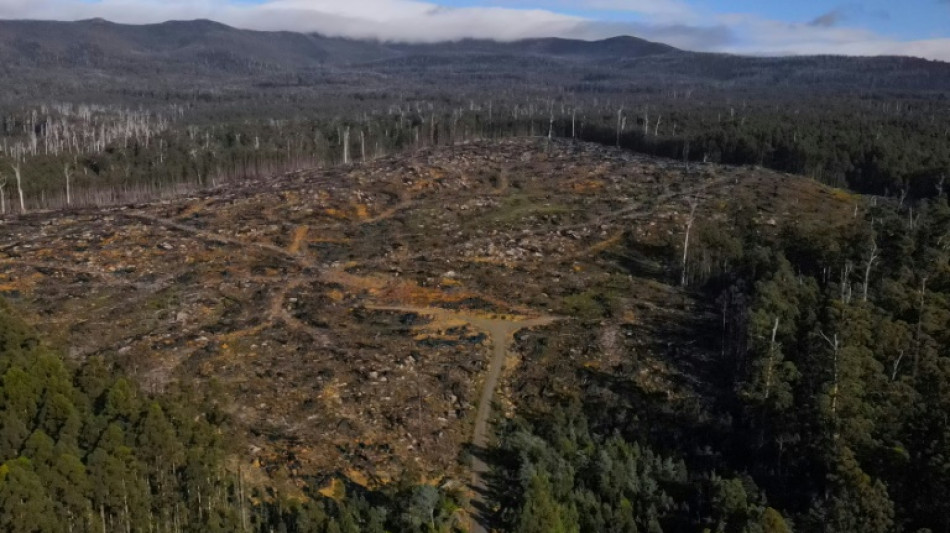
-
 Trump ramps up pressure on Democrats over US government shutdown
Trump ramps up pressure on Democrats over US government shutdown
-
Gauff says more Slam money 'important' for future of tennis

-
 Strange 'rogue' planet spotted guzzling matter like a star
Strange 'rogue' planet spotted guzzling matter like a star
-
Two dead, three wounded in UK synagogue attack

-
 Germany reviews warship order after delays
Germany reviews warship order after delays
-
Norris says Verstappen 'genuinely a challenger' as F1 title race hots up

-
 35 years later, beloved East German car still sputters on
35 years later, beloved East German car still sputters on
-
Japan's Arc hopes take a hit with poor draw, Minnie Hauk gets plum stall
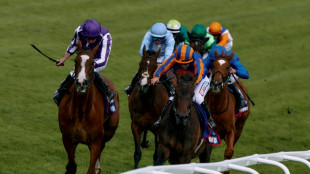
-
 Rescuers say no more signs of life in rubble of collapsed Indonesian school
Rescuers say no more signs of life in rubble of collapsed Indonesian school
-
Barcelona's Camp Nou return delayed again

-
 Israel to deport Gaza flotilla activists
Israel to deport Gaza flotilla activists
-
Contepomi backs inexperienced Argentina playmakers against Springboks

-
 Four wounded, suspect shot in Manchester synagogue attack
Four wounded, suspect shot in Manchester synagogue attack
-
Depardieu sues French broadcaster over report that sped up downfall

-
 Zelensky warns Europe Russia looking to 'escalate' war
Zelensky warns Europe Russia looking to 'escalate' war
-
Spain hosts record number of summer tourists

-
 OpenAI valuation soars to $500 bn in private share sale: reports
OpenAI valuation soars to $500 bn in private share sale: reports
-
Argentina scrum-half Cruz to start against Springboks

-
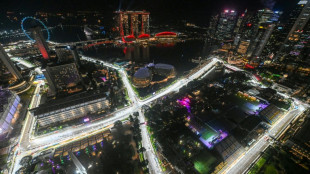 Formula One declares first official 'heat hazard' at Singapore GP
Formula One declares first official 'heat hazard' at Singapore GP
-
Germany recall Schlotterbeck but drop Fuellkrug for World Cup qualifiers

-
 Man City 'not good enough' for frustrated Haaland
Man City 'not good enough' for frustrated Haaland
-
Paris fans now watching fashion shows like sports games

-
 Gauff powers past unseeded Lys in straight sets for Beijing semis
Gauff powers past unseeded Lys in straight sets for Beijing semis
-
France prolongs detention of two from Russia 'shadow fleet' vessel
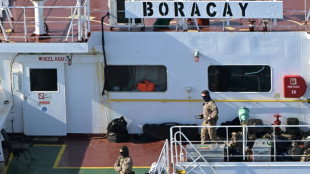
-
 Sinner primed for 'tough challenge' of defending Shanghai title
Sinner primed for 'tough challenge' of defending Shanghai title
-
Israel to deport intercepted Gaza flotilla activists

-
 Eddie Jones demands respect for Japan ahead of 'ambitious' tour
Eddie Jones demands respect for Japan ahead of 'ambitious' tour
-
Dutch warning over 'annoying' chatbots

-
 Markets surge on US rate hopes, tech fired by chip deal
Markets surge on US rate hopes, tech fired by chip deal
-
UK supermarket Tesco lifts profit outlook on competitive prices

-
 Young pianists vie for global glory in Poland's Chopin contest
Young pianists vie for global glory in Poland's Chopin contest
-
Robertson rallies All Blacks with Rugby Championship on the line

-
 Egyptian, Congolese contenders vie for UNESCO top job
Egyptian, Congolese contenders vie for UNESCO top job
-
Siraj on song as West Indies stumble to 90-5 in first India Test

-
 No more signs of life in Indonesia school collapse: rescuers
No more signs of life in Indonesia school collapse: rescuers
-
'Defect or be jailed': Turkey opposition mayors face new threat

-
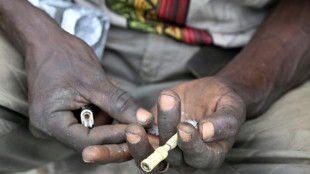 Addicts swap drug dens for support centre in Abidjan
Addicts swap drug dens for support centre in Abidjan
-
Afropop icon Adekunle Gold embraces Nigerian roots with new album

-
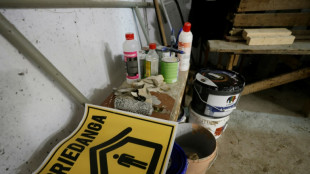 Lithuania builds shelters as drones prowl border skies
Lithuania builds shelters as drones prowl border skies
-
Wallabies bench O'Connor for All Blacks Test as Slipper set for farewell

-
 Zelensky at European summit as EU seeks to bolster backing
Zelensky at European summit as EU seeks to bolster backing
-
Over a dozen Australian suncreams pulled over safety concerns

-
 Dodgers down Reds to advance in MLB playoffs, Yankees stay alive
Dodgers down Reds to advance in MLB playoffs, Yankees stay alive
-
Skipper Scott Barrett returns as All Blacks change six for Wallabies Test

-
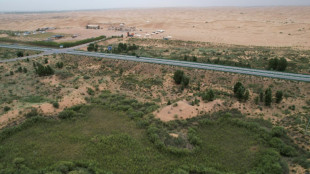 China's 'Great Green Wall' brings hope but also hardship
China's 'Great Green Wall' brings hope but also hardship
-
Let the 'Showgirl' era begin: Taylor Swift's new album is almost here

-
 Philippine quake death toll rises to 72
Philippine quake death toll rises to 72
-
Elon Musk halfway to becoming world's first trillionaire: report

-
 Surridge penalty lifts Nashville over Austin for US Open Cup
Surridge penalty lifts Nashville over Austin for US Open Cup
-
Trump jeopardising US role as scientific leader: Nobel officials


Loggers fell old, native forests on Australian island
On the edge of a dense forest on a rugged Australian island, an enormous stump rises from the ground -- all that remains of a eucalyptus tree that towered into the canopy for centuries.
As wide as two dining tables, and standing above head height, it is the by-product of a logging industry carving its way through swaths of native forest in the island state of Tasmania.
"We're standing on a stump that's 500 years old. That tree was so, so old," said Jenny Weber, campaign manager at the Bob Brown Foundation environmental group.
"The tragedy of this one right in front of us is that it was cut down, and then it was too big to cut up into pieces and put on a log truck," Weber said in Huon Valley's Grove of Giants, west of Hobart.
Cutting down the tree was "shocking, just absolutely shocking", she said.
In Tasmania, cutting down native trees is legal, despite its impact on wildlife and the environment.
With half of its 68,000 square kilometres (26,000 square miles) blanketed in forest, the island is an exception in the dry continent of Australia.
It is also the state that fells the highest share of native trees -- 18.5 percent in the year to June 30, 2023, compared to a national average of 10 percent, according to government figures.
South Australia has protected native forests since the late 19th century, while Victoria and Western Australia have banned the logging of native trees since 2024.
- 'The species disappears' -
In Tasmania, there are calls for the state to stop cutting down native forest too.
More than 4,000 people marched through the streets of the state capital Hobart in March, demanding an end to the practice.
In the crowd of protesters, some dressed as endangered animals, like the Tasmanian devil, an endangered marsupial, or the even scarcer swift parrot.
The broad-tailed parrot is classified as critically endangered by the International Union for Conservation of Nature, which cites the clearance of eucalyptus trees that provide its breeding habitat in Tasmania.
"These birds need the hollows formed in old trees to breed. If there are no hollows, there's no nest, so no chicks, and finally the species disappears," said Charley Gros, a French ecologist and scientific adviser to the Bob Brown Foundation.
Sustainable Timber Tasmania is the state-owned organisation responsible for managing 812,000 hectares (2 million acres) of public production forest.
It aims to harvest timber while "balancing conservation and responsible land management", an official at the state forest manager told AFP.
Its latest annual report says it harvests "around 6,000 hectares of native forest -- less than 1 percent of our total managed land" annually.
Suzette Weeding, the firm's general manager for conservation and land management, said it runs a programme to monitor endangered swift parrots.
This "comprehensive approach" allows "adaptive forest management," Weeding told AFP, "minimising potential disturbance to the species and its habitat".
- Shooting marsupials -
Sustainable Timber Tasmania's report said it sowed 149 million seeds across 5,000 hectares to "regenerate native forest" in the year to June 30, 2024.
In the same period, official data show more than 70 percent of the native trees felled in Tasmania were turned into wood chips -- much of it for export to China and Japan for production of paper, cardboard or toilet paper.
The environmental cost does not figure, however, in the logging industry's balance sheet.
According to government figures, the value of native hardwood harvested in Tasmania in 2022-2023 was Aus$80 million (US$51 million). Census data showed fewer than 1,000 people employed in the state's forest industry in 2021.
Weber is not convinced of Sustainable Timber Tasmania's environmental credentials, pointing to a recently felled area of forest where only charred stumps remain.
To clean the area before replanting, the loggers drop incendiaries from helicopters, producing toxic fumes, she said.
Once new tree seeds sprout, marsupials such as wallabies, possums and pademelons seek out the shoots for food, Weber said.
"Forestry has people to shoot those animals and kill them so they don't actually eat the baby shoots of the trees that they want to grow for more logging in the future."
Only eucalyptus trees are replanted, she added, without the other native species such as myrtles and sassafras that once grew under the canopy.
"Eucalyptus are Australian but eucalyptus can't live to their full life by themselves in a tree farm."
I.Stoeckli--VB
